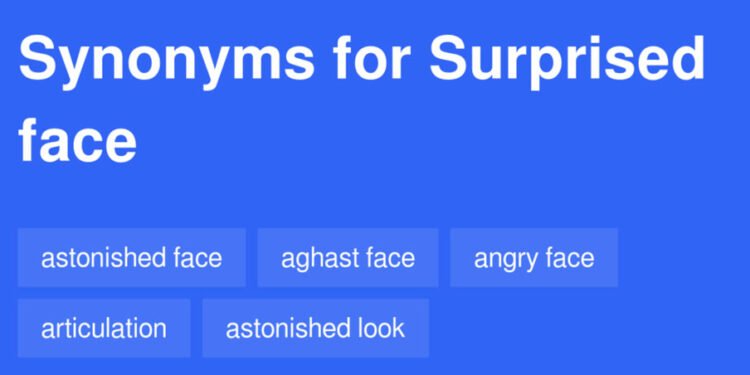Introduction: The Nuance of Surprise
Surprise, a fundamental human emotion, often manifests as a sudden and unexpected event or feeling. It can range from a fleeting moment of mild wonder to an overwhelming sense of shock or delight. Understanding the various shades of this emotion is key to precise communication.
However, relying solely on the word “surprise” can limit expressive potential. Exploring its synonyms is not merely an academic exercise; it is a practical tool for enhancing linguistic dexterity. Each synonym carries its own unique connotations, emotional weight, and contextual appropriateness.
For instance, the feeling evoked by a “startling” piece of news differs significantly from the joy of a “delightful” surprise. Choosing the right word can dramatically alter the reader’s or listener’s perception of the event, adding depth and clarity.
This exploration helps in avoiding repetition, enriching narrative flow, and painting a more vivid picture for the audience, making communication more engaging and nuanced. It allows writers and speakers to articulate the exact nature of an unexpected occurrence.
Why Explore Synonyms for Surprise?
In both written and spoken English, precision in language is paramount. The word “surprise” serves as a general umbrella term, but it often lacks the specificity needed to convey the full spectrum of human reactions to the unexpected.
By delving into its synonyms, one gains access to a richer vocabulary that can articulate subtle differences in intensity, emotional valence, and the nature of the unexpected event itself. This enhances clarity and impact.
Moreover, using a diverse range of vocabulary makes writing more engaging and less monotonous. It demonstrates a command of the language and allows for a more sophisticated expression of thought and feeling.
For content creators and communicators, understanding these nuances is crucial for connecting with an audience on a deeper level and conveying messages with greater accuracy and emotional resonance.
Common Synonyms for Surprise and Their Meanings
To truly master the art of expressing surprise, it is essential to understand the specific meanings and connotations of its various synonyms. These words are not interchangeable but rather offer distinct perspectives on the unexpected.
Words for Mild Surprise
When the unexpected is gentle or fleeting, several words can aptly describe the sensation. These terms often suggest a momentary jolt without significant emotional upheaval, a brief interruption of the ordinary.
Startle implies a sudden, brief shock that might cause a slight physical reaction, like a jump or gasp. It’s often involuntary and quickly subsides, leaving little lasting impact.
Astonish suggests a strong sense of wonder or amazement, often at something impressive or difficult to believe. It’s a more profound reaction than merely being startled, hinting at admiration.
Words for Intense Surprise or Shock
For moments of profound or overwhelming unexpectedness, stronger synonyms are necessary. These words convey a deeper impact, often with a sense of disbelief, disorientation, or even distress.
Shock denotes a sudden and often unpleasant or distressing surprise that can be emotionally or physically jarring. It implies a significant disruption to one’s mental or emotional state, often negative.
Astound conveys a sense of overwhelming surprise, often mixed with admiration or disbelief. It suggests being so surprised that one is left speechless or utterly bewildered by the magnitude of the event.
Flabbergast is a more informal term, meaning to surprise someone so greatly that they are left speechless or utterly confused. It carries a sense of being completely taken aback, often comically so.
Words for Pleasant Surprise
Not all surprises are neutral or negative; many bring joy and delight. These synonyms capture the positive emotional response to an unexpected good event, brightening one’s day.
Delight refers to a feeling of great pleasure or joy, often brought about by something unexpected and pleasing. It’s a warm, positive reaction that fills one with happiness.
Marvel suggests a feeling of wonder and admiration, often at something beautiful, extraordinary, or inexplicable. It implies a sense of awe and deep appreciation for the unexpected.
Words for Unpleasant Surprise
Conversely, some unexpected events are unwelcome and can cause distress or dismay. These words highlight the negative emotional impact, ranging from mild discomfort to significant anxiety.
Dismay indicates a feeling of distress, typically caused by something unexpected and unpleasant. It suggests a sense of disappointment, concern, or even a loss of courage.
Consternation describes a feeling of anxiety or dismay, typically at something unexpected. It implies a sense of confusion and alarm, often leading to a temporary paralysis of thought or action.
Contextual Usage: Choosing the Right Word
The key to mastering these synonyms lies in understanding their contextual nuances. The specific situation, the intensity of the emotion, and the desired impact on the audience all profoundly influence word choice.
For example, one might be “startled” by a sudden noise, “astonished” by a magic trick, “shocked” by tragic news, or “delighted” by an unexpected gift. Each scenario demands a particular word for accuracy.
Careful consideration of these subtle differences allows for more precise and effective communication, elevating the quality of both written and spoken English. It transforms ordinary descriptions into vivid portrayals.
Expanding Your Vocabulary: Practical Examples
To illustrate the practical application of these synonyms, consider the following examples that demonstrate their distinct uses in various contexts:
- “The sudden clap of thunder startled the sleeping cat, making it jump.” (Mild, sudden reaction)
- “She was astonished by the intricate details of the ancient tapestry, a true work of art.” (Wonder, admiration)
- “The news of the sudden resignation shocked the entire company, leaving everyone in disbelief.” (Intense, negative impact)
- “He was flabbergasted by the unexpected promotion, utterly speechless with joy.” (Overwhelmed, speechless)
- “The children were delighted by the surprise party their parents threw, their faces beaming.” (Great pleasure, joy)
- “The architect marveled at the engineering feat of the bridge, a testament to human ingenuity.” (Awe, admiration)
- “The sudden turn of events filled them with dismay, as their plans were ruined.” (Distress, disappointment)
- “There was widespread consternation among the villagers after the mysterious disappearance of the artifact.” (Anxiety, alarm)
Conclusion: Mastering the Art of Expression
Ultimately, the journey to mastering the synonyms for “surprise” is a significant step towards achieving greater linguistic precision and expressive power. Each word offers a unique lens through which to view and describe the unexpected, enriching our communication.
By thoughtfully selecting the most appropriate synonym, communicators can convey not just the fact of a surprise, but also its intensity, emotional tone, and specific impact. This enriches language and allows for a more profound connection with the audience, making every message more impactful and memorable.












